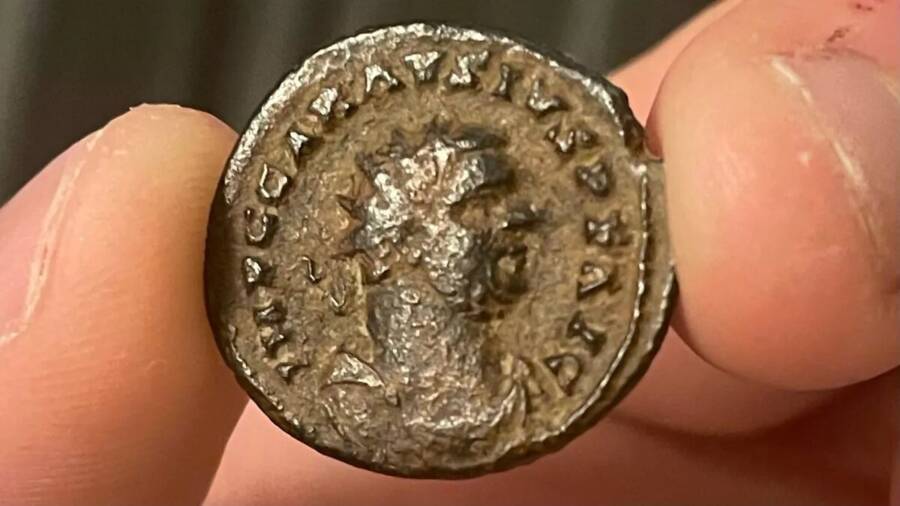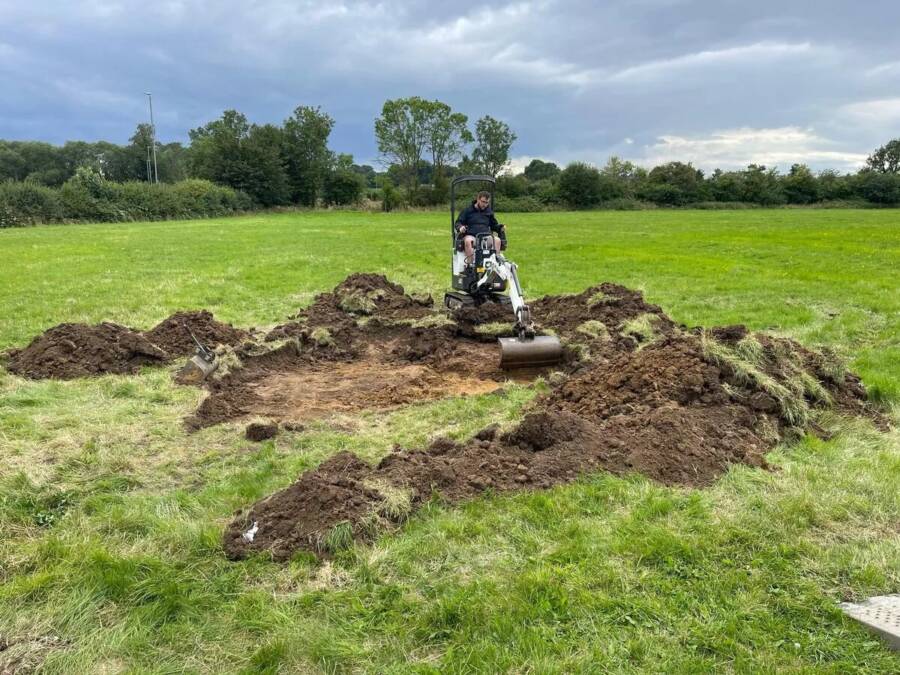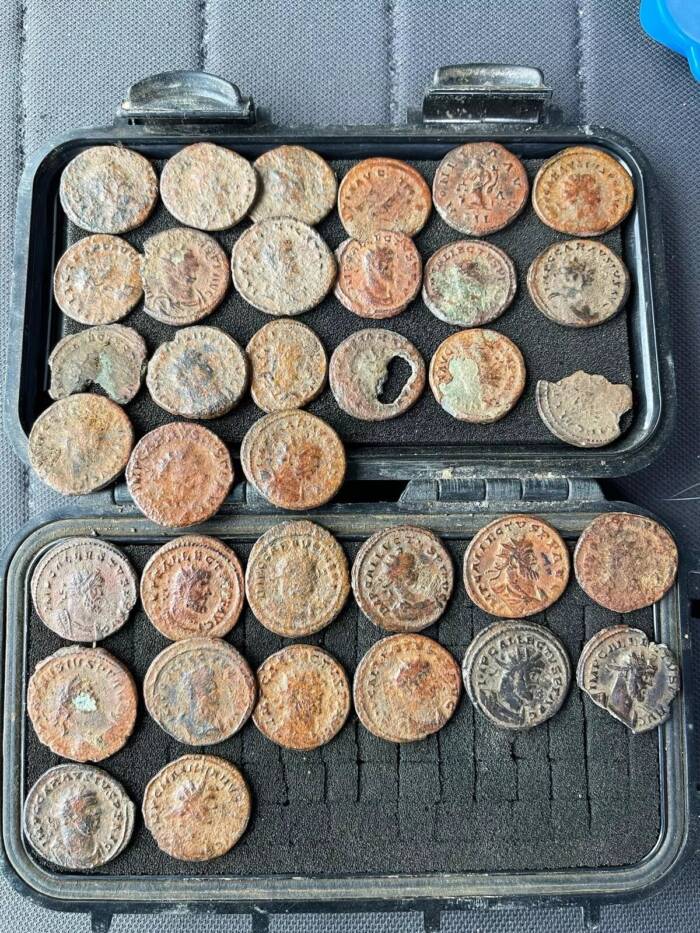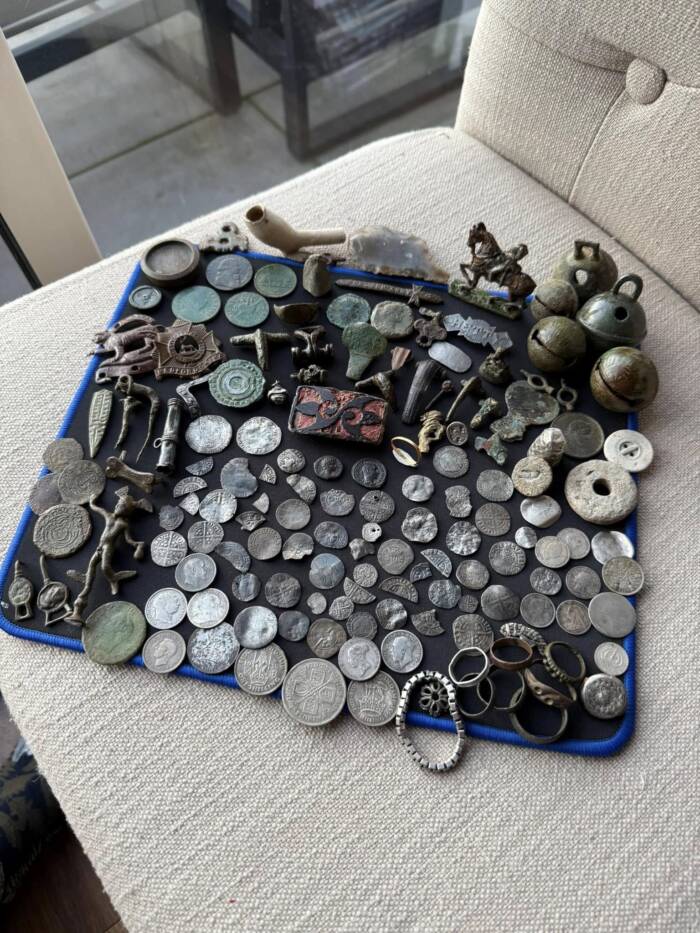While metal detecting in a Leicestershire field, bathroom fitter David Dunn discovered a rare hoard of 50 Roman coins expected to fetch nearly $2,000 at auction.

Leicestershire LiveOne of the Roman coins discovered in a farmer’s field in Leicestershire, England.
What started as a routine day of metal detecting quickly turned into a momentous outing that yielded the discovery of a lifetime.
While scanning a local pasture in Leicestershire, England, bathroom fitter and metal detectorist David Dunn unearthed 50 well-preserved Roman coins dating back to the late 3rd century C.E.
The hoard is set to be auctioned in February 2025, with an estimated value of $1,800.
David Dunn Discovers A Roman Coin Hoard In A Leicestershire Field

Leicestershire LiveDavid Dunn, the metal detectorist who found the Roman coin hoard in Leicestershire.
While searching a pasture in Leicestershire, David Dunn discovered a “once-in-a-lifetime” hoard of Roman coins.
Dunn was scanning the field when a faint signal led him to uncover two Roman coins. With the landowner’s permission, he then expanded his search, digging up a 43-square-foot area and unearthing dozens more.
“Something told me to go to that field. I wasn’t expecting much, but then it just snowballed from there,” Dunn told Leicestershire Live. “Many of the coins are in remarkable condition, with perfect portraits.”

Leicestershire LiveThe excavations at the farmer’s field where the coins were found.
After discovering the hoard, Dunn reported the coins to local authorities, who spent over a year examining them. Despite his efforts to donate the collection to museums, none accepted the offer, leading him to put the 50 Roman coins up for auction at Noonans Mayfair on February 18, 2025, in hopes of ensuring that they find a proper home.
The Significance And Value Of The Roman Coins Unearthed By Dunn

Leicestershire LiveA portion of the Roman coin hoard discovered by David Dunn.
The coins were minted during the reigns of several emperors and military commanders who took power in the centuries just before the fall of Rome, including Carausius (286-293 C.E.), Allectus (293-296 C.E.), Diocletian (284-305 C.E.), and Maximian (286-305 C.E.).
Alice Cullen, a coin expert at Noonans Mayfair, explained the significance of the coins to Leicestershire Live:
“The Antoninianus was a coin used during the Roman Empire thought to have been valued at 2 denarii. This hoard dates from the reigns of Carausius who usurped power in 286 after the Carausian Revolt, and declared himself emperor in Britain and northern Gaul; Allectus, who died in 296 and was a Roman-Britannic usurper-emperor from 293 to 296; Diocletian, nicknamed Jovius, who was Roman emperor from 284 until his abdication in 305, and Maximian who reigned from 286 to 305, sharing the title of Augustus with his co-emperor and superior Diocletian.”
The hoard also contained a previously unknown variety of coins from ancient Rome, one minted during the reign of Carausius and decorated with a bust of Diocletian on one side and a woman on the other.
Although the hoard is expected to fetch up to $1,800 at auction, David Dunn is far more excited about the thrill of uncovering historical artifacts than he is in any personal financial gain. In fact, he plans to donate most of the proceeds to the farmer who owns the land.

Dave Dunn/FacebookA selection of David Dunn’s discoveries from 2024.
“The money doesn’t interest me,” Dunn said. “I love finding history. The farmer has had a tough few years since Covid, so I’d like to give him most of it if it can help in any way. Just being out in the fresh air after a long day’s work is what I enjoy. Finding something like this is just a bonus.”
After reading about the Roman coin hoard, dive into 11 of the most famous gladiators in ancient Rome. Then, read about the enduring mystery of how and why the ancient Britons built Stonehenge.





